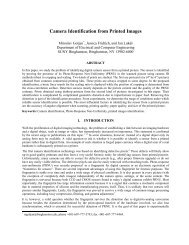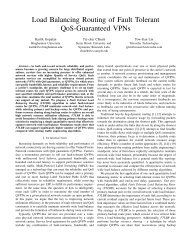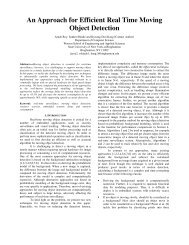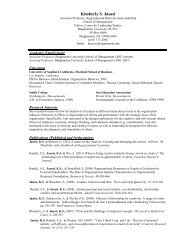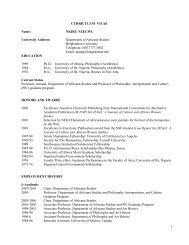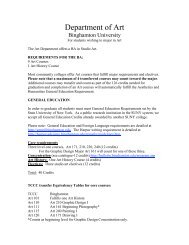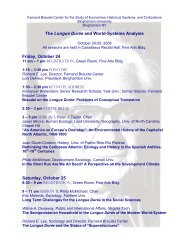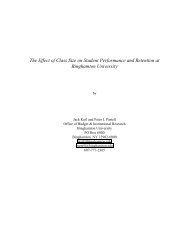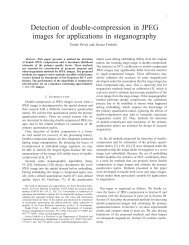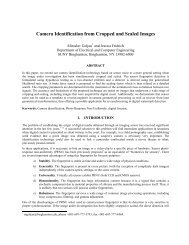Volume 8, Issue 1 Fall 2010 — Special Edition - Binghamton ...
Volume 8, Issue 1 Fall 2010 — Special Edition - Binghamton ...
Volume 8, Issue 1 Fall 2010 — Special Edition - Binghamton ...
Create successful ePaper yourself
Turn your PDF publications into a flip-book with our unique Google optimized e-Paper software.
Institute of Global Cultural Studies, <strong>Volume</strong> 8, <strong>Fall</strong> <strong>2010</strong> 3Nkrumah of Ghana, Felix Houphouët-Boigny ofthe Ivory Coast, Leopold Senghor of Senegal,Nnamdi Azikiwe of Nigeria, and Gamal AbdelNasser of Egypt.But more dazzling than Nigeria‘s politicianswere Nigeria‘s leaders in culture and the arts.Chinua Achebe became by far Africa‘s bestsellingnovelist. Wole Soyinka was making hisway toward becoming Africa‘s first Nobel PrizeLaureate in Literature. Senegal, Nigeria, and laterDar es Salaam and Kampala hosted major Pan-African festivals of Arts and Culture.Other Nobel Laureates in Literature includedNadine Gordimer of South Africa, Najuib Mahfuzof Egypt and J. M. Coetzee also of South Africa.Africa has been richer in Nobel Peace Laureates.These have been: Albert Luthuli, ArchbishopTutu, Nelson Mandela, F. W. de Klerk,Anwar Sadat, Wangari Maathai (first womanAfrican Peace Laureate), Kofi Annan, andMohammed El-Baradei.Bad news in Africa in this period includedthe Sharpeville Massacre in South Africa in 1960,Nigeria‘s civil war 1967–1970, and the multipleconflicts of the Sudan in the South and in theWest. There was also the horrendous genocidalcollapse in Rwanda in 1994. The Global Mr.Hyde had exploded into genocide in Rwanda inthat year. But in the same year of 1994 theGlobal Dr. Jekyll ended political apartheid inSouth Africa.As the 20th century was coming to an endone happy development was the end of politicalapartheid in South Africa, but not the end of economicapartheid as yet.The black man in South Africa acquired thepolitical crown, but the white man successfullyretained the economic jewels.Gender achievements of this half century includednot only Kenya‘s Wangari Maathai, as thefirst black woman to win the Nobel Prize forPeace, but also Ellen Johnson Sirleaf in Liberiaas the first elected African woman head of state.The most spectacular African Diaspora eventthis decade was Barack Obama — this son of aKenyan father was successfully elected Presidentof the United States. Barack Obama hasbecome the most powerful black person in thehistory of civilization. More powerful than RamsesII of Egypt, Menelik II of Ethiopia, and Shaka Zuluof South Africa. Obama is the most powerful sonof a Muslim father since the dynasty of Harun-al-Rashid of the Abbasid over ten centuries ago.But is Obama afraid of his own power? Is he aDr. Jekyll afraid of becoming Mr. Hyde?In addition to heroes there have been martyrs.Early martyrs of Africa‘s independence includedthe assassination of Patrice Lumumba inJanuary 1961 and of Sylvanus Olympio in 1963.The UN puts its troops in harm‘s way in conflictsituations. The UN also lost its Secretary-Generalin Africa‘s cause, Dag Hammarskjold in1961. Was the air crash near Ndola an accident(on a plane called Albertina), or was it sabotagedby a nefarious global Mr. Hyde?There was even a suspicion that DagHammarskjold wanted to die in Africa‘s cause,―Do I fear a compulsion in me to be so destroyed?Tired and lonely. So tired the heart aches,‖Hammarskjold lamented in writing.IGCS Director Ali A. Mazrui being interviewedby African journalists in 2002.Dag Hammarskjold was another supremeDr. Jekyll afraid of turning into a Mr. Hyde.A tale of two history makers: Salim AhmedSalim and Adebayo AdedejiIn the earlier years of Tanzania‘s independenceSalim Ahmed Salim became the secondmost important architect of Tanzania‘s post colonialforeign policy — after Julius K. Nyerere himself.In those initial decades of independenceSalim Ahmed Salim served as the most seniorMinister of Foreign Affairs and as the PermanentRepresentative of Tanzania at the UN. AmongAfrican ambassadors he often led the way onimportant issues, including the struggle to get thePeople‘s Republic of China admitted to the UNas the proper occupant of the fifth PermanentSeat in the Security Council instead of the fig leafof Taiwan.It is widely believed that Salim AhmedSalim‘s visible role in the admission of CommunistChina to the UN cost Salim Ahmed Salim thechance to become the first African Secretary-General of the UN instead of Boutros Boutros-Ghali a few years later.The US Administrations of both LyndonJohnson and Richard Nixon, in reality misunderstoodSalim Ahmed Salim‘s role in the UN — andbecame hostile to him.Salim Ahmed Salim himself has denied thathe danced in ecstasy in the corridors of the UNwhen the People‘s Republic of China won thevote of admission. But he did play a dignified rolein the politics of supporting China‘s assumptionof proper role as a major power in the SecurityCouncil.Subsequently Salim Ahmed Salim was electedrepeatedly as Secretary-General of the Organizationof African Unity (O.A.U.) — becoming thelongest serving Secretary-General of the O.A.U.He helped to move the O.A.U. towards amore active role in managing African conflicts —including civil wars.He also helped to sharpen the O.A.U.‘s rolein the struggle against apartheid in South Africaand the effort to liberate Namibia.With the help of the late Chief M. K. O.Abiola of Nigeria and President Ibrahim Babangida,Salim Ahmed Salim helped create the Committeeof Eminent Persons of the O.A.U. with amission to demand reparations for hundreds ofyears of African enslavement, colonization andracial exploitation. I was sworn in before Africa‘spresidents as a member of the Reparations Committeeof Eminent Persons.The debate on reparations is still alive andwell in the United States and the United Kingdom.The controversy was recently reignited by ProfessorHenry Louis Gates Jr., of Harvard in anarticle he published in the New York Times. ProfessorGates made the case that the election ofBarack Obama to the U.S. Presidency had madethe reparations debate moot.Salim Ahmed Salim is great partly becauseof what he achieved domestically as Prime Ministeras well as Foreign Minister of Tanzania, butalso as O.A.U. Secretary-General in the finalyears of the 20th century.History will also note that Salim AhmedSalim nearly became the first African Secretary-General of the UN. He also nearly became Presidentof the United Republic of Tanzania — butfor the ethnic politics of Zanzibar.But he has lived to maintain the legacy ofJulius K. Nyerere in his continuing internationalactivities and as leader of the Julius K. NyerereFoundation in Dar es Salaam.We salute Salim Ahmed Salim not only as adistinguished Tanzanian — but also as a majorarchitect of Pan Africanism in the first fifty yearsof postcolonial history.Adebayo AdedejiOne of the two or three most distinguishedpolitical economists produced by postcolonial Africahas been Adebayo Adedeji.As Executive Secretary (or Secretary-General)of the UN Economic Commission for Africa,Dr. Adedeji became a major role model of the left




